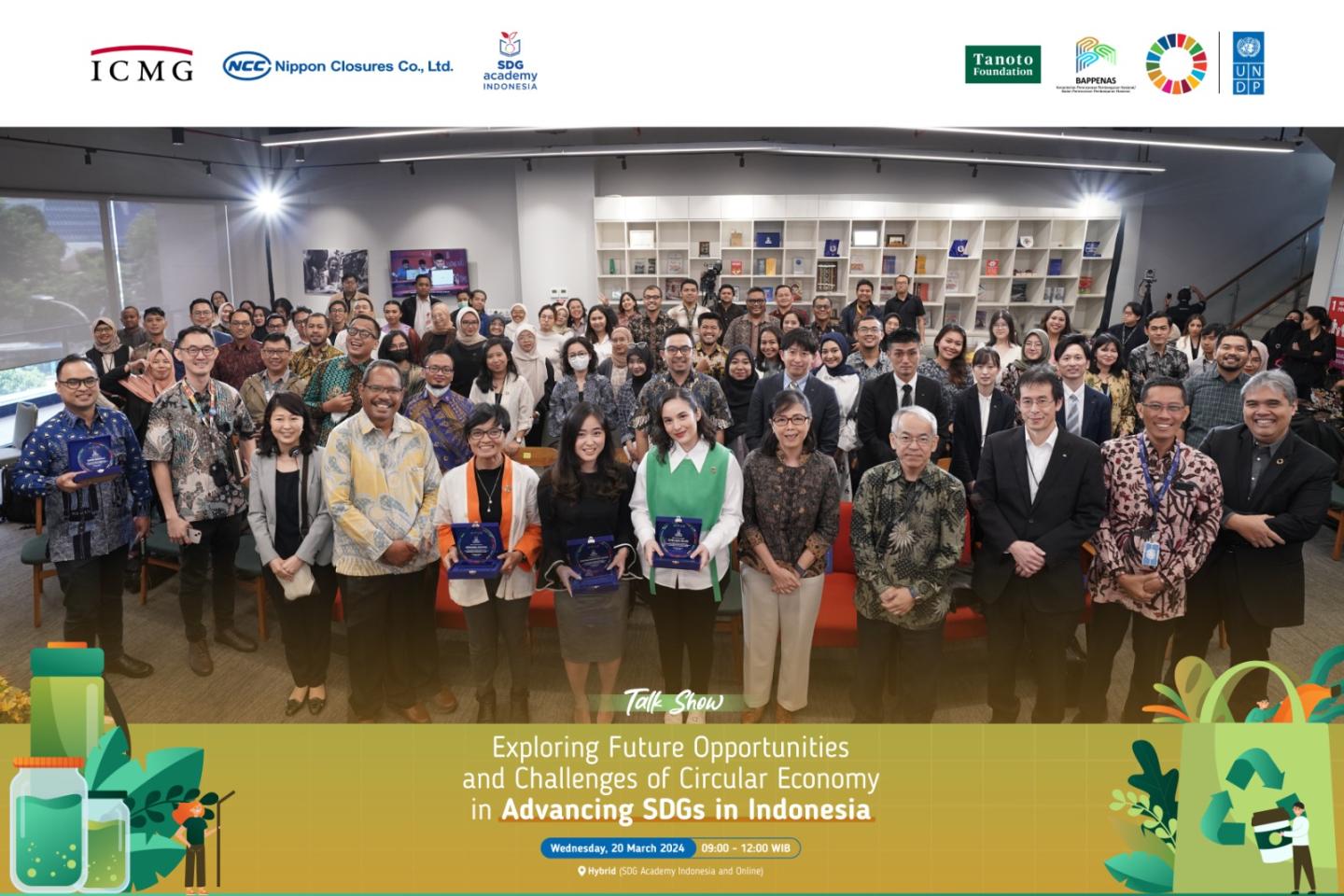Capacity Building on Circular Economy: The Journey of Indonesia and Japan collaboration through SDG Academy Indonesia
Capacity Building on Circular Economy: The Journey of Indonesia and Japan collaboration through SDG Academy ... United Nations Development Programme


Accelerating the Sustainable Development Goals (SDGs) in Indonesia

Introduction
It takes substantial collaboration to accelerate the attainment of the Sustainable Development Goals (SDGs) in 2030. This is why UNDP Indonesia through SDG Academy Indonesia (SDAI) together with Nippon Closures Co., Ltd and ICMG have set a remarkable example.
What is SDG Academy Indonesia?
In the pursuit of sustainable development goals (SDGs), education plays a pivotal role in driving changes and fostering inclusive growth. Recognizing this, SDG Academy Indonesia has emerged as a beacon of hope, empowering communities and catalyzing positive transformation across the archipelago. Through its innovative programs and collaborative approach, SDG Academy Indonesia is shaping a brighter future for Indonesia and beyond.
SDG Academy Indonesia was launched in 2020 as a program which was developed based on a collaboration between UNDP Indonesia, Indonesia’s Ministry of Development Planning (Bappenas), and Tanoto Foundation. To accelerate the SDGs achievement in Indonesia, SDG Academy Indonesia stands on its vision as an innovative capacity building program aiming to increase Indonesia’s state and non-state actors’ capacities in localizing the Sustainable Development Goals (SDGs), covering the areas of governance and policy, innovative solutions, and monitoring and reporting. In supporting its vision, the Academy has a mission to empower all SDGs stakeholders’ leaders in Indonesia to effectively and intelligently use the SDGs framework to jointly deliver on Indonesia’s sustainable development agenda 2030.
What are the programs of SDG Academy Indonesia?
Moving from its mission and vision, the Academy provides a wide array of capacity-building efforts aimed at expanding understanding, enhancing leadership skills, and strengthening commitments to SDGs. These main goals are achieved through three primary programs: the SDG Leadership Program, the SDG Mobile Learning Program, and Knowledge Sharing Platform.
SDG Leadership Program and Mobile Learning Program were established in 2021. The SDG Leadership Program is an intensive five-month capacity-building program, which is designed to nurture SDG leaders. The courses encompass governance, leadership, and SDG-focused topics, and guide the participants to create capstone projects to solve the SDGs related challenges in their communities. After completing the program, participants will be awarded with the title, “SDG-Certified Leaders.” In the first quarter of 2024, a total of 195 alumni graduated from the program.
The mobile learning program is a year-round Massive Open Online Courses (MOOCs) accessible to everyone who is interested in learning about SDGs and its related topics. Materials are delivered in Indonesian language. Today, the Academy offers 15 learning modules available on the platforms. As per December 2023, the platform has 8,000+ registered learners, 13,000+ course enrollment, and 47% completion rate.
Aside from the two mentioned programs, the Academy has two knowledge sharing platforms, namely Beranda Inspirasi and Alun-alun Inovasi. Beranda Inspirasi was launched in 2021 as an interactive medium where users can share their SDG-related ideas/opinion, innovation and programs through writings. As per December 2023, there are 560+ active users on the platform and 380+ articles published.
On the other hand, Alun-Alun Inovasi launched in 2023, emerged as a platform to share curated contents on good practices, new approaches, innovation related to SDGs implementations, and SDGs in actions. The platform has exhibited 10 best practices on SDGs-related projects.
Aside from the mentioned programs, SDG Academy Indonesia actively engages in providing knowledge on SDGs, especially for youth, through its campaign and outreach program such as SDG Talk, One Day SDGs, Writing Competitions, and Speaking Engagements. In 2024, through its SDG Talk program, SDG Academy Indonesia has successfully partnered with Indonesia’s Balai Guru Penggerak (Transformational Teacher Association) in four provinces in Indonesia and attracted around 11.400+ teachers to participate in the collaborative webinar on SDGs introduction.
Partnership journey of NCC-ICMG and SDG Academy Indonesia
SDG Academy Indonesia believes that partnership is the key to achieve the SDGs, therefore in 2021, SDG Academy Indonesia explored partnership with the Nippon Closures Co., Ltd and ICMG. From a series of discussions, NCC, ICMG, and SDG Academy Indonesia raised similar concerns on awareness and implementation of the circular economy in Indonesia. Therefore, in July 2022, NCC – ICMG and SDG Academy Indonesia formally collaborated to conduct capacity building programs on Circular Economy in Indonesia.
Circular Economy (CE) is seen as the powerful breakthrough to force transformation of ‘business as usual’ into sustainable business (linear economy into circular economy). The goal is to create a closed-loop system where products and materials are continuously cycled through various stages, reducing environmental impact and promoting sustainability.
Highlighting the two years partnership since 2022, NCC-ICMG and SDAI have successfully completed four programs under the series of capacity building on CE with a total of more than a thousand beneficiaries across Indonesia from various backgrounds including from the private sector, government, CSO/NGO, and academia.
Strengthening public understanding through Mobile Learning Program on CE
The Academy also launched new learning resources on CE as one of the results of the collaboration with NCC. The module was developed based on issues raised from the Circular Economy Dialogue series held from October 2022 to March 2023.
This learning material
SDGs, Targets, and Indicators in the Article
1. SDGs Addressed or Connected to the Issues Highlighted in the Article
- SDG 4: Quality Education
- SDG 8: Decent Work and Economic Growth
- SDG 9: Industry, Innovation, and Infrastructure
- SDG 12: Responsible Consumption and Production
- SDG 17: Partnerships for the Goals
The article highlights the efforts of SDG Academy Indonesia in promoting sustainable development goals through education and capacity-building programs. This aligns with SDG 4, which aims to ensure inclusive and equitable quality education and promote lifelong learning opportunities for all. The programs also contribute to SDG 8 by fostering economic growth and decent work through the development of leadership skills and innovative solutions. Additionally, the focus on circular economy and sustainable business practices relates to SDG 9 and SDG 12, which promote industry, innovation, and responsible consumption and production. The partnerships formed by SDG Academy Indonesia with Nippon Closures Co., Ltd and ICMG demonstrate the commitment to SDG 17, which emphasizes the importance of partnerships for achieving the goals.
2. Specific Targets Under Those SDGs Based on the Article’s Content
- SDG 4.7: By 2030, ensure that all learners acquire the knowledge and skills needed to promote sustainable development.
- SDG 8.2: Achieve higher levels of economic productivity through diversification, technological upgrading, and innovation.
- SDG 9.2: Promote inclusive and sustainable industrialization and foster innovation.
- SDG 12.2: By 2030, achieve the sustainable management and efficient use of natural resources.
- SDG 17.16: Enhance the global partnership for sustainable development, complemented by multi-stakeholder partnerships.
The targets identified are based on the article’s focus on education for sustainable development (SDG 4.7), capacity-building programs for leadership and innovation (SDG 8.2 and SDG 9.2), promoting responsible consumption and production (SDG 12.2), and fostering partnerships for sustainable development (SDG 17.16).
3. Indicators Mentioned or Implied in the Article
- Number of participants in the SDG Leadership Program and Mobile Learning Program
- Number of registered learners, course enrollment, and completion rate on the mobile learning platform
- Number of active users and articles published on the knowledge sharing platforms
- Number of teachers participating in the SDG Talk program
- Number of beneficiaries and diverse backgrounds of participants in the capacity building programs on Circular Economy
The article mentions several indicators that can be used to measure progress towards the identified targets. These indicators include the number of participants in the SDG Leadership Program and Mobile Learning Program, the number of registered learners, course enrollment, and completion rate on the mobile learning platform, the number of active users and articles published on the knowledge sharing platforms, the number of teachers participating in the SDG Talk program, and the number of beneficiaries and diverse backgrounds of participants in the capacity building programs on Circular Economy.
Table: SDGs, Targets, and Indicators
| SDGs | Targets | Indicators |
|---|---|---|
| SDG 4: Quality Education | 4.7: By 2030, ensure that all learners acquire the knowledge and skills needed to promote sustainable development. | – Number of participants in the SDG Leadership Program and Mobile Learning Program – Number of teachers participating in the SDG Talk program |
| SDG 8: Decent Work and Economic Growth | 8.2: Achieve higher levels of economic productivity through diversification, technological upgrading, and innovation. | – Number of participants in the SDG Leadership Program and Mobile Learning Program – Number of beneficiaries and diverse backgrounds of participants in the capacity building programs on Circular Economy |
| SDG 9: Industry, Innovation, and Infrastructure | 9.2: Promote inclusive and sustainable industrialization and foster innovation. | – Number of participants in the SDG Leadership Program and Mobile Learning Program – Number of beneficiaries and diverse backgrounds of participants in the capacity building programs on Circular Economy |
| SDG 12: Responsible Consumption and Production | 12.2: By 2030, achieve the sustainable management and efficient use of natural resources. | – Number of participants in the SDG Leadership Program and Mobile Learning Program – Number of beneficiaries and diverse backgrounds of participants in the capacity building programs on Circular Economy |
| SDG 17: Partnerships for the Goals | 17.16: Enhance the global partnership for sustainable development, complemented by multi-stakeholder partnerships. | – Number of participants in the SDG Leadership Program and Mobile Learning Program – Number of beneficiaries and diverse backgrounds of participants in the capacity building programs on Circular Economy |
Behold! This splendid article springs forth from the wellspring of knowledge, shaped by a wondrous proprietary AI technology that delved into a vast ocean of data, illuminating the path towards the Sustainable Development Goals. Remember that all rights are reserved by SDG Investors LLC, empowering us to champion progress together.
Source: undp.org

Join us, as fellow seekers of change, on a transformative journey at https://sdgtalks.ai/welcome, where you can become a member and actively contribute to shaping a brighter future.







